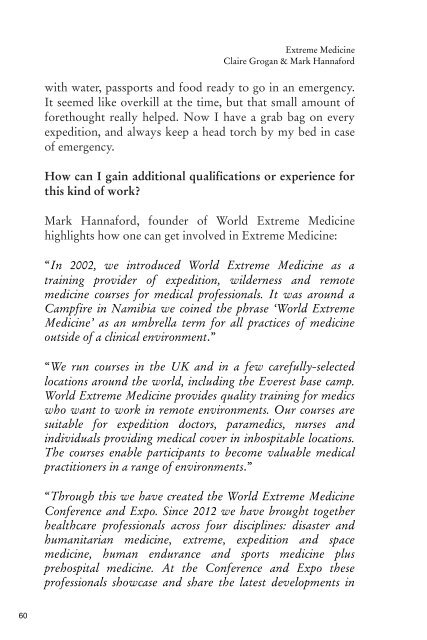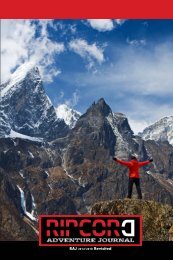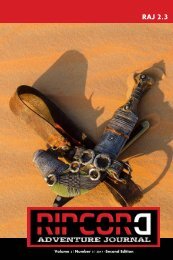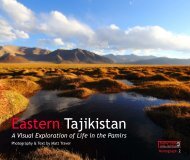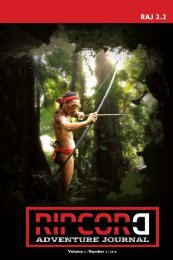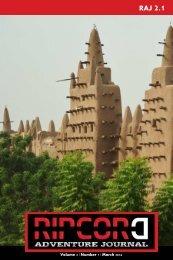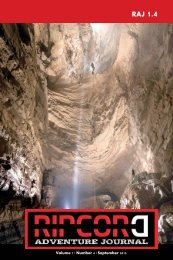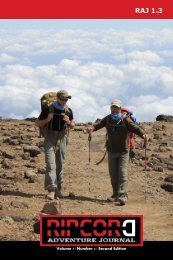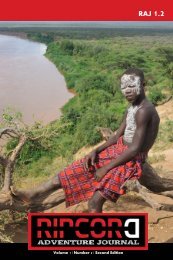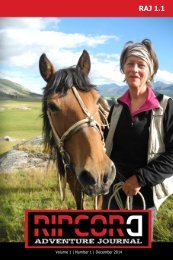Ripcord Adventure Journal 2.4
Our final issue of volume 2 is quite a mixture of adventure and exploration of the world's polar regions, deserts, oceans, mountains and jungles. In our Guest Editorial, Leon McCarron ventures in to the hills of Jordan as part of his 1000-mile journey on foot, across the Middle East, when he encounters an unexpected musical interlude on a lonely hillside. Planning is essential for major expeditions, even more important to have several back-up plans in case the first one or two, or three do not pan out as expected. Mark Wood brings us behind the scenes of planning for a polar expedition. Technology in the classroom has been touted for more than 2 decades as the next big thing. Here, Joe Grabowski, whose nascent organisation "Exploring by the Seat of Your Pants" has demonstrated that indeed technology can be the medium by which exposure to new and exciting educational contexts can be brought in to the classroom from the real-life connections with explorers, conservationists and scientists in the field. Former Marine Commando, John Sullivan gives us an introduction to what it takes to survive in the desert using the skills and experience he has built up from his time in the forces, leading expeditions and working with film crews on location. What does it take to circumnavigate the globe on one's own, what drives an adventurer to take on and complete such demanding challenges? Erden Eruc takes us with him on his life's journey across oceans and continents. Finally, we catch up with emergency medical doctor Claire Grogan and Mark Hannaford of World Extreme Medicine to discuss the fast-paced world of extreme medicine.
Our final issue of volume 2 is quite a mixture of adventure and exploration of the world's polar regions, deserts, oceans, mountains and jungles.
In our Guest Editorial, Leon McCarron ventures in to the hills of Jordan as part of his 1000-mile journey on foot, across the Middle East, when he encounters an unexpected musical interlude on a lonely hillside.
Planning is essential for major expeditions, even more important to have several back-up plans in case the first one or two, or three do not pan out as expected. Mark Wood brings us behind the scenes of planning for a polar expedition.
Technology in the classroom has been touted for more than 2 decades as the next big thing. Here, Joe Grabowski, whose nascent organisation "Exploring by the Seat of Your Pants" has demonstrated that indeed technology can be the medium by which exposure to new and exciting educational contexts can be brought in to the classroom from the real-life connections with explorers, conservationists and scientists in the field.
Former Marine Commando, John Sullivan gives us an introduction to what it takes to survive in the desert using the skills and experience he has built up from his time in the forces, leading expeditions and working with film crews on location.
What does it take to circumnavigate the globe on one's own, what drives an adventurer to take on and complete such demanding challenges? Erden Eruc takes us with him on his life's journey across oceans and continents.
Finally, we catch up with emergency medical doctor Claire Grogan and Mark Hannaford of World Extreme Medicine to discuss the fast-paced world of extreme medicine.
You also want an ePaper? Increase the reach of your titles
YUMPU automatically turns print PDFs into web optimized ePapers that Google loves.
Extreme Medicine<br />
Claire Grogan & Mark Hannaford<br />
with water, passports and food ready to go in an emergency.<br />
It seemed like overkill at the time, but that small amount of<br />
forethought really helped. Now I have a grab bag on every<br />
expedition, and always keep a head torch by my bed in case<br />
of emergency.<br />
How can I gain additional qualifications or experience for<br />
this kind of work?<br />
AAAAAAAAAAAAAAAAAAAAAAAAAAAAAAAAA<br />
AAAAAAAAAAAAAAAAAAAAAAAAA<br />
Mark Hannaford, founder of World Extreme Medicine<br />
highlights how one can get involved in Extreme Medicine:<br />
“In 2002, we introduced World Extreme Medicine as a<br />
training provider of expedition, wilderness and remote<br />
medicine courses for medical professionals. It was around a<br />
Campfire in Namibia we coined the phrase ‘World Extreme<br />
Medicine’ as an umbrella term for all practices of medicine<br />
outside of a clinical environment.”<br />
“We run courses in the UK and in a few carefully-selected<br />
locations around the world, including the Everest base camp.<br />
World Extreme Medicine provides quality training for medics<br />
who want to work in remote environments. Our courses are<br />
suitable for expedition doctors, paramedics, nurses and<br />
individuals providing medical cover in inhospitable locations.<br />
The courses enable participants to become valuable medical<br />
practitioners in a range of environments.”<br />
“Through this we have created the World Extreme Medicine<br />
Conference and Expo. Since 2012 we have brought together<br />
healthcare professionals across four disciplines: disaster and<br />
humanitarian medicine, extreme, expedition and space<br />
medicine, human endurance and sports medicine plus<br />
prehospital medicine. At the Conference and Expo these<br />
professionals showcase and share the latest developments in<br />
60


